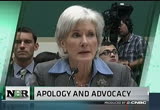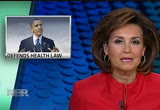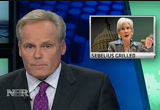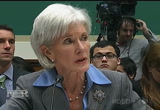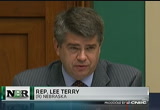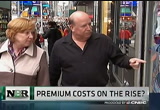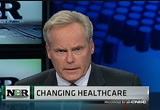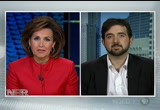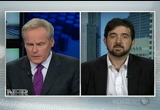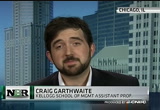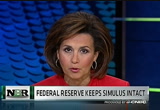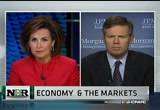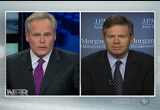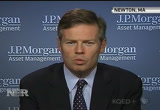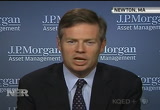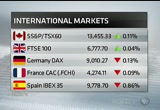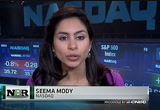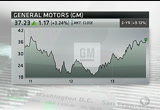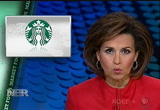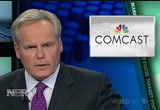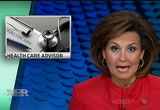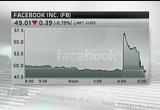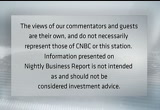tv Nightly Business Report PBS October 30, 2013 6:30pm-7:01pm PDT
6:30 pm
this is nig"nightly busines report" with tyler mathisen and susie gharib brought to you in part by. >> thestreet.com. interactive financial multimedia tools for an ever changing financial world. our dividend stock advisor guides and helps generate income during a period of low interest rates. we are thestreet.com. hold me accountable for the debacle. i'm responsible. >>ç apology and advocacy, the health and human services chief acre cements blame for the botched rollout of the obama care website as the president argues the law is really a good thing, but what does the affordable care act mean if you're covered under an employer plan? pops and drops, stocks,
6:31 pm
bonds, gold and the dollar all on the move after the fed said it will keep the stimulus in place. but is it what the central bank didn't say that really drove the market? >> facebook, the sial network reports strong profits and the stock jumps, what investors need to know about facebook's financials. all that and more tonight on "nightly business report" for wednesday, october 30th. good evening everyone. we begin with president obama on the defensive speaking from boston, the president tried to drum up support for the troubled health care program. he chose samuel hall where a massachusetts health care plan was signed into law seven years ago and considered a successful template for the president's own affordable care act. he admitted to problems with his health care website and that people are getting cancellations notices, but he said giving people health care should be a no brainer. shifting blame for cancelled policies on private insuranceç
6:32 pm
companies. >> nobody is losing their right to health care coverage, and no insurance company will be able to deny you coverage or drop you as a customer all together. those days are all over, and that's the truth. [ applause ] >> that is the truth. >> despite the rocky start to the health care marketplace, president obama assured the crowd quote we'll see this through. >> seeing it through is what the president had in mind but different on capitol hill, grilled and drilled as members of the house grilled health and human services secretary kathleen sebelius over the rollout of the healthcare.gov website. it was over administration claims that would ensure people they could keep their present plans no matter what. the trouble is many carriers are cancelling low-cost, low-coverage plans because they don't compile with tough insurance standards under the law. bertha coombs has more on the
6:33 pm
contentious hearing. >> reporter: kathleen sebelius seemed prepared for tough questioning starting off with an apology to americans for the rocky rollout of healthcare.gov. the site was down again today. >> you deserve better. i apologize. i'm accountable to you for fixing these problems, and i'm committed toç earning your confidence back. >> reporter: republican members pressed sebelius about health officials' late changes to the system design and the lack of proper testing, which last week contractors said contributed to the site's malfunctioning. >> nobody indicated this could go this wrong. i was always advised there is always a risk with a new product and site but never suggested that we delay the launch of october 1st, nor did our contractors suggest that to us. >> reporter: a number of members held up letters from constituents whose plans had been cancelled in the individual market. sebelius insisted administration
6:34 pm
did not mislead americans when the president said that they could keep their plans. >> plans change -- >> sure, every year. >> over time that the -- >> but -- >> they wouldn't be -- not because of our rules but because of insurance companies -- >> but you set up those market rules look like what they have to compile with, correct? >> only if they chose not to grandfather the policy -- >> that meant that couldn't make a change -- >> any grand father -- >> but if they made any change -- >> no, they could make changes in pricing. they could make changes in benefits. >> reporter: after saying for weeks they wouldn't releaseç enrollment data prematurely, today the secretary explained why. >> that data out there exists -- >> sir, i will tell you right now it's not reliable day to according to the insurance companies who are eager to have customers, they are not getting reliable data all the way
6:35 pm
through the system. >> reporter: with another outage and the horribled healthcare.gov for much of the day today, secretary sebelius says she's confident that the website will be up and fully up to speed by november 30th. in time for people who want to enroll for coverage starting on january 1st. we are th bertha coombs, "nightly business report." most don't have to shop for a new insurance plan on the government exchanges because millions get coverage through their jobs and with the annual open enrollment period approaching companies big and small, h are wondering how it will change for them and if it means big price increases for their health insurance premiums. >> reporter: larry burns from outside philadelphia just got the news from his employer, his health inas you were rans premium for next year is going up. >> maybe 8%, 9%, something like that. >> reporter: he's not alone. across the country, employers
6:36 pm
are sending out annual enrollment material with a ill, higher premiums, in a some cases double digits and part of the blame, federally mandated health care changes, health care reform, the affordable care act. >> here it is, pay it. >> reporter: it's not just higher premiums. deductibles are rising as companies try to shift more of the risk and responsibility for health care costs to their workers. rising premiums at work are nothing new. in fact, they have been going up for years. the kizer family foundation that tracks these things, says over the past 10 years your cost of coverage at work has gone up 89%. employers have been passing on their added cost and then some as insurers like aetna pass on their cost. they say the affordable care act is compounding the problem. >> it will pass to the customers over a billion dollars worth of taxes and fees associated with
6:37 pm
the affordable care act that need to go into pricing. >> reporter: divided among aetna's 22 million members, that's not much but some say there are other added costs. children covered on parents' plans until they are 26 and protections for preexisting conditions. >> the analogy would be your house starts to burn. you call the insurance company immediately and say i would like household insurance. they say okay, sure. >> reporter: even employers say much of the increases are simply the result of rising health care costs and more people using health care. factors that at least for now have nothing to do with obama care. scott cohn, "nightly business report." here to talk more about the changing landscape of health insurance is greg, assistant professor of management at northwestern university kellogg school of management and specializes in health care. good to have you with us. i assume you heard scott's
6:38 pm
package there. i want to get your best guess, estimate of how much or what percentage of the premium increase i may get next year in my company plan is atranscribable to the affordable care act. is it 20%? 50%? 80%? ? >> i don't have an exact number but we'll see a mixture of two things that are causing premiums to go up. one is that we're coming out of recession so it will increase again. we had relatively low increases as a result of the recession and the second is that a lot of company plans have to be more generous to meet minimum standards under the affordable care act and those are the primary drivers of increased premiums. >> the other thing people are asking questions is whether you work for aç company, a big company or no company that ultimately every american person is going to have to sign up for these health care exchanges. is that a good thing? are the pros and cons of that? >> i think what we'll see is
6:39 pm
that a lot more people in employer coverage will move into the exchanges and that probably will be a good thing for them. these will be people who are eligible for thousands of dollars in subsides for the federal government and now that they get insurance from the employer, they will be free to move from a large to small employer and lots of benefits there -- >> aren't there also downsides to that, too? >> certainly at a minimum, the cost of the bill is going to end up being far greater than we estimate and that will come out of every individual taxpayer. we're not preparing for the increased cost. >> is what you're saying professor, that more and more companies will get away from offering health insurance as a primary benefit to employees, big companies and small companies. >> if you have a lot of low income employees and you give them health benefits and they are ineligible for the subsidies, for a family of four,
6:40 pm
a subsidy worth $13,000, so it will be a change in the paradigm of the employer thatç a lot of what we used to give as good employers, it might be better to not offer insurance and let them qualify for subsidies. >> now the whole premise of this affordable care act is to get healthy, young people to sign up for the program. the way things are going, do you see that happening and if it doesn't, what does that mean for the whole financial, you know, the financial health of this health care plan? >> i mean, that's all going to hinge on the website and from my view the primary reason why sebelius should have been apologizing today because if we don't get the website working and easy for people to sign up, then the people who least want health insurance, the young healthy people susie is talking about, those people won't sign up and if we don't get them into the pools, we'll have a series of exchanges that have relatively old and sick people, and the economics of the affordable care act doesn't
6:41 pm
work. >> you're very quick opinion, is disconnecting health insurance from health enemployment good? >> yes. >> craig garth way at the kellogg school northwestern. a story about how changes and expenses are turning many financial advisors into health care çadvisors. disappointing news in the adp jobs report. private companies added just 130,000 jobs this month, fewer than forecast as the 16-day partial government shutdown and debt limit stand off appeared to slow and already weak labor market. that's one reason that the federal reserve decided today to continue the massive bond buying program to give the u.s. economy a boost. wrapping up a two-day meeting policy makers at the central bank forecast weaker growth ahead and said the fed will continue the stimulus program and keep the key interest rate
6:42 pm
at 0%. the fed's state signalled the economy continues to improve but only modestly. investors poured over the statement and seemingly didn't find much to hold on to. stocks set out records yet, maybe they were just tired today and that's why they sold off. probably as good an explanation as any. the dow 61 and nasz deck off 21 and s&p lower by eight. treasury notes were low and yields sparked higher at 2.54%. joining us more to talk about the fed meeting, david kelly, chief global strategist at jp morgan fund. no surprises on that fed decision. even was expecting it but there was speculation one of the reasons the marketsç stayed in the minus column was that there was speculation that maybe ben bernanke will begin this whole tapering thing before he steps down as chief any time between december and january. what do you think?
6:43 pm
>> i think that's possible. i don't think anything in the statement would have said that. i think that the only piece of news in the statement is that they removed language which they put in the last time around which said they were worried about rising interest rates. if you recall back in september when they decided not to taper then, what they said is they were worried rising interest rates would slow the economy. they remove that language. if you think back then the ten-year treasure rye yield was 2.7% and this morning 2.48%. so 2.7% we're worried, 2.48% we're fine. why should people buy a bond at 2.48 expecting rates to go down and i think that probably hurt the stock market, but overall, not a lot of news in today's statement. >> six weeks ago, today, david, i can't remember a more egg early anticipated meeting. it had none of that drama. are you expecting that there will begin a pulling back of the bond purchasing sometime over the next six months, and will it
6:44 pm
be by ms. yellen or mr. ç bernanke. >> yes, and i think it's a close call. the key trigger has to do with the other side of washington. i'm confident the economy will pick up enough. i'm confa tend the unemployment rate will come down enough to justify the fed tapering but the real issue is will we have an extension of the debt ceiling, will we deal with another potential government shutdown in january. if we can have the government fully financed through 2014 with no issue on the debt ceiling, that removes the last inpediment. they have a long way to go to get back to normal and need to get going. so if in january in the middle of january we do come up with an agreement in washington to fund the government and to extend the debt ceiling, then i think it's possible that with ben bernanke's last meeting at the end of january, they will begin to taper. >> turning back the stimulus,
6:45 pm
massive stimulus will be tricky. if it falls in the lap of janet yellen, what are the key things she has to do so that in no way do those actions disrupt the markets and economy? >> the first thing, of course, they need to get started. i think they shouldn't over state the value of helping this economy because this economy isn't doing that well. it is growing 2% since the start of the expansion and removing the qe won't really hurt the ç economy, really. i think the federal reserve needs to express confidence the economy can grow without the stimulus and get going and raise -- allow us to get back to a clear path towards normal. if people think the federal reserve is back to norming, they may get back to normal decisions on businesses. >> the s&p 500 is up 24 odd % this year. how much of the gain is directly attributable to what the fed is doing? >> i don't think a lot of it is.
6:46 pm
we've seen more money going into equity funds because they feel there is no opportunity in fixed income but for most of the rally it's moving out of the equity mutual funds as the market goes up and suggests it's not really qe pushing the market up, just the market was too cheap so in professional investors recognize some opportunity there. i still believed market is over valued but if you keep the seal growing here, the markets will become over valued and the fed needs to get going to make sure it doesn't get out of hand. >> have to leave it there. david, thank you so much. david kelly, chief global strategist at jp morgan fund. what is helping drive general motors into the strong's financial position in years? that story is next.
6:47 pm
earnings out after the closing bell facebook sending shares soaring. the networking giant beating estimates on strong growth in mobile advertising, which now accounts for half of the overall revenue. facebook earned 17 cents a share excludeing certain items with total revenue topping $2 billion. seema mody joins us from the nasdaq exchange. you had a chance to look over the numbers. what is the one take away you see in facebook's third quarter numbers? >> sure, susie, what is getting investors excited is facebook is making more money on mobile, sales from mobile adds made up 49% of facebook's total ad revenue and saw a jump in mobile agentive monthly users. it's driving more users via
6:48 pm
mobile phone and strengthening the mobile growth strath strike that sgee and that's what they really got this quarter. >> seema mody reporting from nasdaq for us. meanwhile, bump the opening bell this morning, general motors said profits fell moreç than 50% but the quarterly number was still better than wall street estimated. the auto maker reported strong sales of pickup trucks and said european operations are improving but still posting heavy losses. phil labeaux has more. >> reporter: general motors is revving up profit excludeing special items they made 96 cents a share, 2 cents better than expected. >> revenue up, cash up, strong quarter across the board. >> reporter: gm is making most of the money more than $2.2 billion-dollar in north america where u.s. sales are driven in part by new versions of the severe silverado and gmc sierra
6:49 pm
pickup trucks. the launch on those trucks has been near textbook perfect. those trucks have helped gm hold onto the lead as the number one auto maker in the u.s. ahead of ford, toyota and chrysler. meanwhile, gm reported a 60% drop in earnings over saws and cut losses in europe and sales in china remain strong and gm holding $26 billion, investors are asking when the auto maker will run tom money to shareholders with a dividend. >> priority number one is reinvest in the business,ç priority number two is to maintain and strengthen the balance sheet which we've been continuing to do including avkttiveties through the quarter and priority three again red returns to the shareholders and we'll evaluate that over time. >> reporter: today's earnings pushed shares close to the highest price since the ipo in 2009. with the u.s. treasury scheduled to sale the remaining steak in general motors over the next couple months, gm is hoping the
6:50 pm
stigma of being bailed out by uncle sam will fade away and with it, any doubts the new gm will repeat the same mistakes that led the old gm to file for bankruptcy. phil lebaux "nightly business report", chicago. >> to read more, head to our website, nbr.com. visa shares drop after the bell and that's where we begin tonight's market focus. the world's largest credit card company reported a decline in the quarterly profit. visa sited a tax reserve as the reason for the fall overshadowing an increase in the payments processed. shares fell a fraction to $203.82 and decline continued after the close. more people around the world are visiting starbucks stores, which helped boost profits. the coffee giant saw a 34% rise in earnings butç revenues slightly lower than expected and profit forecast for next year was soft. nonetheless, the ceo said he was
6:51 pm
proud of the result. this quarter is a stunning quarter, which caps, as i said, the best performing and operating year in the history of the company. for us to have 8% comps in america with the store base and 7% globally at a time in the world when the consumer is under pressure is such a significant accomplishment. >> shares fell after hours but finished the regular session higher to $80.83. shares of the f izzy drink maker soda stream plunged. profits fell slightly because of higher operating cost and revenue missed but soda stream kept the full-year outlook. the stock down more than 10%, $56.87 the close. comcast the nation's largest cable provider reported earnings that beat estimate' as they generated more cash flow for cable and nbc universal. shares of the cable company, the
6:52 pm
parent of "nightly business report's" producer fell to $47.09. coming up, you go to a financial advisor when it comes to budget and investments but would you go to one with health care questions? first a look at commodities, treasuries and currencies. if you're confused by the new vocabulary of health insurance, you're not alone. it's not a wonder many are turning to financial advisors to turn to health care options and cost and getting a health care advisor, too. sharon epperson explains. >> reporter: if it wasn't already difficult, saving for retirement, uncertainty about the cost of health care has become a major concern.
6:53 pm
would you turn to your financial advisor for guidance? >> more than likely i would find someone in an insurance broker, someone that understands the insurance participant of it. >> i don't rely on my financial advisor for health care. >> i wouldn't even ask him. his job is to handle money that i have invested, not take care of my health care. >> i think they should be part of the process. it's a big part of finances. >> now many wear at least two hats as those who focus primarily on investments are tasked with helpingç clients navigate the landscape. the affordable care act resulted in developments of the delivery of health care which is making retirement planning even more challenging, especially as many employers are changing or plan to change coverage for retirees. a study this month found for those employers that sponsor a retiree health plan, 40% plan to
6:54 pm
discontinue it in 2015. >> i find most people are more comfortable in talking about health care problems than financial issues because health problems aren't under you control. if a planner is comfortable, ask basic questions like what medications are you on, have you ever been in the hospital? those are what clients are happy to share. >> reporter: the key is to find a financial planner who takes a 360-degree view of health care choices, and understands the risks and tax consequences. >> you want that expertise or that knowledge of the actual health care options but you need that per riff yell vision of a certified financial planner to understand that, you know, the tax impacts, the cash flow impacts, you know, all the other ways in which your health care impacts your total financial picture. >> reporter: someone with a cfp, the certifiedç financial plann designation is required to
6:55 pm
complete training in comprehensive financial training, not only in making investment decisions. for "nightly business report", i'm sharon epperson. >> and for more on where to look for a health care advisor, log on to our website, nbr.com. finally tonight, forbes magazine is out with the world's most powerful people. here are the top three, in third place, the general secretary of china's communest party and in a surprise move barack obama drops to number two from the stop spot and taking his place russian president vladimir putin. recapping facebook's earnings, following an initial pop after hours, the stock reversed direction, one thing the market may focus on, comments on a late-day conference call where the cfo saw a decrease in daily users, specifically among younger teens. >> look at that drop. >> look at that. a short-lived drop in facebook
6:56 pm
stock. that's "nightly business report" for tonight. i'm susie gharib thanks so much for watching. >> thanks from me, as well. i'm tyler mathisen. have a great evening everybody. see you back here tomorrow night. "nightly business report" has been brought to you by. >> thestreet.com, interactiveç financial multimedia tools for an ever changing financial world. our dividend stock advisor guides and helps generate income during a period of low interest rates. we are thestreet.com.
7:00 pm
hello and welcome to this is us. i'm becka king reed. this week we're experiencing the rich history of san jose. right now we're in the heart of the city at the sight of the first state capital. san jose was founded in 1777 and is the oldest settlement in the golden state. today we're going to find out what makes san jose one of the most fascinating cities in california. we'll also meet a revolutionary biologists who's one with the dolphins. an astronaut who took flight aboard the discovery. and one of california's most famous rugby coaches. we have some great stories to share
105 Views
Uploaded by TV Archive on

 Live Music Archive
Live Music Archive Librivox Free Audio
Librivox Free Audio Metropolitan Museum
Metropolitan Museum Cleveland Museum of Art
Cleveland Museum of Art Internet Arcade
Internet Arcade Console Living Room
Console Living Room Books to Borrow
Books to Borrow Open Library
Open Library TV News
TV News Understanding 9/11
Understanding 9/11
